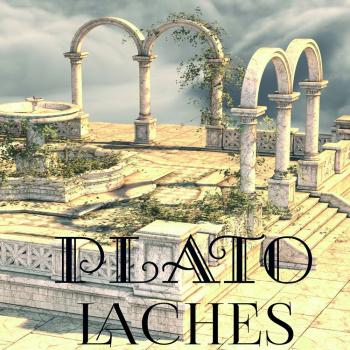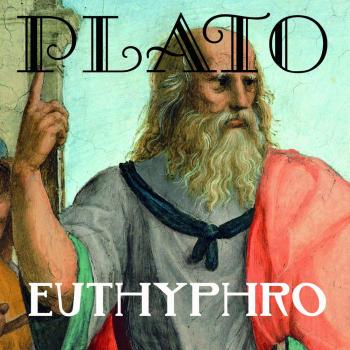Мультимедийное издательство Стрельбицкого
Все книги издательства Мультимедийное издательство СтрельбицкогоMeno
Meno (Greek: Μένων, Menōn) is a Socratic dialogue scripted by Plato. It appears to attempt to determine the definition of virtue, or arete, meaning virtue in general, rather than particular virtues, such as justice or temperance. The first part of the work is written in the Socratic dialectical style and Meno is reduced to confusion or aporia. In response to Meno's paradox (or the learner's paradox), however, Socrates introduces positive ideas: the immortality of the soul, the theory of knowledge as recollection (anamnesis), which Socrates demonstrates by posing a mathematical puzzle to one of Meno's slaves, the method of hypothesis, and, in the final lines, the distinction between knowledge and true belief. Plato's Meno is a Socratic dialogue in which the two main speakers, Socrates and Meno (also transliterated as Menon), discuss human virtue: whether or not it can be taught, and what it is. Additional participants in the dialogue include one of Meno's slaves and the Athenian politician Anytus, a prosecutor of Socrates with whom Meno is friendly. Meno is visiting Athens from Thessaly with a large entourage of slaves attending him. Young, good-looking and well-born, Meno is a student of Gorgias, a prominent sophist whose views on virtue clearly influence Meno's. He claims early in the dialogue that he has held forth many times on the subject of virtue, and in front of large audiences. One feature of the dialogue is Socrates' use of one of Meno's slaves to demonstrate his idea of anamnesis, that certain knowledge is innate and «recollected» by the soul through proper inquiry. The dialogues of Plato – Early, Transitional and middle, Later middle, Phaedo, Later middle, Late, Of doubtful authenticity.
Menexenus
The Menexenus (Greek: Μενέξενος) is a Socratic dialogue of Plato, traditionally included in the seventh tetralogy along with the Greater and Lesser Hippias and the Ion. The speakers are Socrates and Menexenus, who is not to be confused with Socrates' son Menexenus. The Menexenus of Plato's dialogue appears also in the Lysis, where he is identified as the «son of Demophon», as well as the Phaedo. The Menexenus consists mainly of a lengthy funeral oration, referencing the one given by Pericles in Thucydides' account of the Peloponnesian War. Socrates here delivers to Menexenus a speech that he claims to have learned from Aspasia, a consort of Pericles and prominent female Athenian intellectual. Menexenus is unique among the Platonic dialogues in that the actual 'dialogue' serves primarily as exposition for the oration. For this reason, perhaps, the Menexenus has come under some suspicion of illegitimacy, although Aristotle's invocation of the text on multiple occasions seems to reinforce its authenticity. Much of the interest in the Menexenus stems from the fact that it is one of the few extant sources on the practice of Athenian funeral oratory, even though it parodies the medium. Famous dialogues of Plato – Early: Apology, Charmides, Crito, Ion, Euthyphro, Hippias MinorIon, Laches, Lysis; Transitional and middle: Cratylus, Euthydemus, Gorgias, Menexenus, Meno, Phaedo, Protagoras, Symposium; Later middle: Parmenides, Phaedrus, Republic, Theaetetus; Late: Critias, Laws, Philebus, Sophist, Statesman, Timaeus.
Lysis
Lysis (Greek: Λύσις), is a dialogue of Plato which discusses the nature of philia (φιλία), often translated as friendship, while the word's original content was of a much larger and more intimate bond. It is generally classified as an early dialogue. The main characters are Socrates, the boys Lysis and Menexenus who are friends, as well as Hippothales, who is in unrequited love with Lysis and therefore, after the initial conversation, hides himself behind the surrounding listeners. Socrates proposes four possible notions regarding the true nature of loving friendship as: Friendship between people who are similar, interpreted by Socrates as friendship between good men. Friendship between men who are dissimilar. Friendship between men who are neither good nor bad and good men. Gradually emerging: friendship between those who are relatives (οἰκεῖοι «not kindred») by the nature of their souls. Of all those options, Socrates thinks that the only logical possibility is the friendship between men who are good and men who are neither good nor bad. In the end, Socrates seems to discard all these ideas as wrong, although his para-logical refutations have strong hints of irony about them. Famous dialogues of Plato – Early: Apology, Charmides, Crito, Ion, Euthyphro, Hippias MinorIon, Laches, Lysis; Transitional and middle: Cratylus, Euthydemus, Gorgias, Menexenus, Meno, Phaedo, Protagoras, Symposium; Later middle: Parmenides, Phaedrus, Republic, Theaetetus; Late: Critias, Laws, Philebus, Sophist, Statesman, Timaeus.
Laches
The Laches (Greek: Λάχης) is a Socratic dialogue written by Plato. Participants in the discourse present competing definitions of the concept of courage. Laches – Athenian general and statesman, son of Melanopus. Famous dialogues of Plato – Early: Apology, Charmides, Crito, Ion, Euthyphro, Hippias MinorIon, Laches, Lysis; Transitional and middle: Cratylus, Euthydemus, Gorgias, Menexenus, Meno, Phaedo, Protagoras, Symposium; Later middle: Parmenides, Phaedrus, Republic, Theaetetus; Late: Critias, Laws, Philebus, Sophist, Statesman, Timaeus.
Ion
In Plato's Ion (Greek: Ἴων) Socrates discusses with the titular character, a professional rhapsode who also lectures on Homer, the question of whether the rhapsode, a performer of poetry, gives his performance on account of his skill and knowledge or by virtue of divine possession. It is one of the shortest of Plato's dialogues. Famous dialogues of Plato – Early: Apology, Charmides, Crito, Ion, Euthyphro, Hippias MinorIon, Laches, Lysis; Transitional and middle: Cratylus, Euthydemus, Gorgias, Menexenus, Meno, Phaedo, Protagoras, Symposium; Later middle: Parmenides, Phaedrus, Republic, Theaetetus; Late: Critias, Laws, Philebus, Sophist, Statesman, Timaeus.
Euthyphro
Euthyphro (Ancient Greek: Εὐθύφρων, romanized: Euthyphrōn; c. 399–395 BC), by Plato, is a Socratic dialogue whose events occur in the weeks before the trial of Socrates (399 BC), between Socrates and Euthyphro. The dialogue covers subjects such as the meaning of piety and justice. The Euthyphro dialogue occurs near the court of the archon basileus (king magistrate), where Socrates and Euthyphro encounter each other; each man is present at the court for the preliminary hearings to possible trials. Euthyphro has come to present charges of murder against his own father who, after arresting one of his workers for killing a slave from the family estate on Naxos Island, tied him and threw him in a ditch where he died of exposure to the elements without proper care and attention while Euthyphro's father awaited to hear from the exegetes about how to proceed. Socrates is astonished by Euthyphro's confidence in being able to prosecute his own father for the serious charge of manslaughter, despite the fact that Athenian Law allows only relatives of the dead man to file suit for murder. Euthyphro dismisses the astonishment of Socrates, which confirms his overconfidence in his own critical judgment of matters religious and ethical. The dialogues of Plato – Early, Transitional and middle, Later middle, Phaedo, Later middle, Late, Of doubtful authenticity.
Crito
Crito (Ancient Greek: Κρίτων [krítɔːn]) is a dialogue by the ancient Greek philosopher Plato. It depicts a conversation between Socrates and his wealthy friend Crito regarding justice (δικαιοσύνη), injustice (ἀδικία), and the appropriate response to injustice. Socrates thinks that injustice may not be answered with injustice, and refuses Crito's offer to finance his escape from prison. The dialogue contains an ancient statement of the social contract theory of government. In contemporary discussions, debate over the meaning of Crito attempt to determine whether it is a plea for unconditional obedience to the laws of a society. The conversation, which may be based on a true historical event, was published in 399 BC. Since his trial in Apology, Socrates has been imprisoned for four weeks, with his execution coming in a matter of days. Historians are not aware of the exact location of Socrates' cell, but according to excavations, it is about 100 meters southwest of the Heliaia court, just outside the site of the agora. Other than Socrates, Crito is the only other character in the story. Crito himself is a rich Athenian, who like Socrates is from Demos Alopeke. Once charged with corrupting the youth and atheism, Crito unsuccessfully vouched to pay Socrates' bail. Additionally, after Socrates was sentenced to death, Crito was ready to pledge to the court that Socrates would not flee in order to spare him the prison sentence. This plea was ultimately rejected. Through both the trial and the execution, Crito was present. In other dialogues, Crito is a conventional Athenian, who cannot understand Socrates' philosophy, despite his attempts to do so. The dialogues of Plato – Early, Transitional and middle, Later middle, Phaedo, Later middle, Late, Of doubtful authenticity.
Любить (НЕ) страшно
Каковы психологические истоки наших поступков, страхов и ошибок? Это не просто увлекательный психологический триллер. Это глубокая и захватывающая история с неожиданными поворотами сюжета и судеб прекрасных, но порочных героев. Напряженный психологический сюжет с непредсказуемой развязкой раскрывает перед нами мир нарциссизма, хитросплетения взаимоотношений и драматизм самопознания дерзко и с юмором. Автор исследует любовь, секс, трагедию и способность человеческого духа побеждать все.
Пасхальные рассказы. Сборник
Христианство оказало глубокое воздействие на мировую литературу, поэтому во многих произведениях нашли свое художественное воплощение и события Священной истории, и память о них – церковные праздники. Так, литературное значение Рождества давно признано и писателями, и читателями: существует даже жанр «рождественского рассказа». А вот Пасха как главный православный праздник получала художественное развитие только в русской литературе. Существует не малая, во многом пока не собранная антология пасхальных произведений, в создании которой участвовали многие русские поэты и писатели. Настоящий сборник «Пасхальные рассказы» – подборка произведений классиков русской литературы, посвященная великому светлому празднику Пасхи, куда вошли следующие Прекрасна жизнь для воскресших – Леонид Андреев Мужик Марей – Федор Достоевский На страстной неделе – Антон Чехов Накануне поста – Антон Чехов Христос воскрес – Андрей Белый Фигура – Николай Лесков Христова ночь – Михаил Салтыков-Щедрин Старый звонарь – Владимир Короленко Светлое Воскресенье – Николай Гоголь Пасхальные письма – Владимир Соловьев Братья Аримафейские – Михаил Арцыбашев Пасхальный рассказ – Надежда Тэффи Семья разговляется – Надежда Тэффи
Наука о том, как быть здоровым
Быть здоровым – это подарок судьбы, игра случайностей или наука? Автор этой книги утверждает, что наука, которую можно постичь и применить. Универсальный Принцип Жизни в этой книге объясняется настолько простыми и понятными словами, что каждый сможет с легкостью следовать приведенным здесь советам и в результате наслаждаться великолепным самочувствием. Методы, которые вы здесь найдете, были проверены автором на себе и сотнях других людей, и неизменно приводили к успеху. Наука быть здоровым доказала свою эффективность, а ее законы действуют с такой же неумолимостью, как и законы физики или химии.









